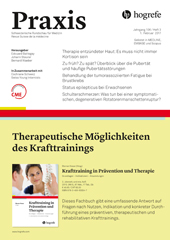Abstract
Zusammenfassung. Die tumorassoziierte Fatigue ist ein häufig auftretendes und ernstzunehmendes Beschwerdebild mit belastenden körperlichen, psychischen und sozialen Auswirkungen, das im Verlauf einer Brustkrebserkrankung zu jedem Zeitpunkt auftreten kann. Das Erscheinungsbild der tumorassoziierten Fatigue ist in der klinischen Symptomatik wie auch in den pathophysiologischen Mechanismen sehr heterogen und komplex. Sowohl die Abklärung von Ursachen als auch die Behandlung erfordert ein differenziertes Vorgehen. Eine frühzeitige Therapie der tumorassoziierten Fatigue ist wichtig, um einer möglichen Chronifizierung entgegenzuwirken. Die Behandlung der Fatigue-Symptomatik erfolgt mittels medikamentöser und nicht-medikamentöser Therapieansätze. Während pharmakologische Interventionen mit Psychostimulanzien in der Behandlung der Fatigue-Symptomatik inkonsistente Resultate zeigen, können die Beschwerden der Fatigue-Symptomatik durch nicht-pharmakologische Interventionen, besonders körperliches Training, kognitiv-behaviorale Therapie, Psychoedukation, komplementärmedizinische Behandlungen (Akupunktur, Yoga, phytotherapeutische Verfahren mit Ginseng) deutlich gemindert werden.
Abstract. Cancer-related fatigue appears frequently during and beyond cancer treatment and constitutes one of the most common and deleterious post-treatment problems in breast cancer survivors. These adverse health outcomes can significantly impact physical and mental functioning, interferes with daily activities and may also have devastating social and economic consequences. The fatigue syndrome in breast cancer patients is a heterogeneous condition of complex and multifactorial etiology. The assessment and treatment of cancer-related fatigue should be multifaceted and tailored to the needs of the individual patient. An early treatment of cancer-related fatigue is important to prevent chronic manifestation. Non-pharmacological and pharmacological approaches are commonly employed to treat underlying symptoms of fatigue; however, limited evidence exists documenting any effectiveness of psycho-stimulants in the management of fatigue. Physical exercise, cognitive behavioral therapy, psycho-education and complementary medicine (acupuncture, yoga, phototherapeutic treatment with ginseng) can be effective in treating the fatigue and associated symptoms.
Résumé. La fatigue associée au cancer apparaît fréquemment pendant et à la suite d’un traitement anticancéreux. Elle constitue un de problèmes post-traitement les plus fréquents et plus délétères et peut avoir un impact négatif sur les fonctions physiques et mentales, interférer avec les activités de chaque jour et avoir des effets dévastateurs sur le plan social et économique. Le syndrome de fatigue chez les malades souffrant d’un cancer du sein est une condition hétérogène découlant d’une étiologie complexe et multifactorielle. L’évaluation et le traitement de ce syndrome devrait comporter de multiples facettes et être adapté aux besoins du malade individuel. Un traitement précoce est important pour prévenir une chronicité. Des approches non-pharmacologiques et pharmacologiques sont communément utilisées pour traiter ce type de fatigue; néanmoins il n’y a que peu d’évidence concernant l’efficacité des psycho-stimulants. L’exercice physique, la thérapie cognitive comportementale, l’éducation et les médecines complémentaires (acupuncture, yoga, photothérapie associée à du ginseng) peuvent améliorer la fatigue et les symptômes associés chez les malades présentant un cancer du sein.
Bibliografie
, .: Schweizerischer Krebsbericht 2015. Bundesamt für Statistik (BFS), Nationales Institut für Krebsepidemiologie und -registrierung (NICER). S. 71–74. https://www.bfs.admin.ch/bfsstatic/dam/assets/350143/master. Letzter Zugriff: 26.12.2016.
National Comprehensive Cancer Network , NCCN Clinical Practice Guidelines in Oncology. Cancer-Related Fatigue. Version 1, 2016. https://www.nccn.org/professionals/physician_gls/f_guidelines.asp. Letzter Zugriff: 26.12.2016.: Inflammation and behavioral symptoms after breast cancer treatment: do fatigue, depression, and sleep disturbance share a common underlying mechanism?J Clin Oncol 2011; 29: 3517–3522.
: Cancer-related fatigue: the scale of the problem. Oncologist 2007; 12 (Suppl 1): 4–10.
: Risk factors, prevalence, and course of severe fatigue after breast cancer treatment: a meta-analysis involving 12 327 breast cancer survivors. Ann Oncol 2016; 27: 965–974.
,.: Fatigue in long-term breast carcinoma survivors: a longitudinal investigation. Cancer 2006; 106: 751–758.
, .: Erratum to: The biology of cancer-related fatigue: a review of the literature. Support Care Cancer 2015; 23: 2853.
: The Functional Assessment of Chronic Illness Therapy (FACIT) Measurement System: properties, applications, and interpretation. Health Qual Life Outcomes 2003; 1: 79.
: The hospital anxiety and depression scale. Acta Psychiatr Scand 1983; 67: 361–370.
: Management of fatigue in patients with cancer – a practical overview. Cancer Treat Rev 2014; 40: 791–799.
, .: Cognitive behavioral therapy for insomnia, but not armodafinil, improves fatigue in cancer survivors with insomnia: a randomized placebo-controlled trial. Support Care Cancer 2016; 24: 2059–2066.
, .: Fatigue during breast cancer radiotherapy: an initial randomized study of cognitive-behavioral therapy plus hypnosis. Health Psychol 2009; 28: 317–322.
: Effects of supervised exercise on cancer-related fatigue in breast cancer survivors: a systematic review and meta-analysis. BMC Cancer 2015; 15: 77.
: Exercise for the management of cancer-related fatigue in adults. Cochrane Database Syst Rev 2012; 11: CD006145.
: Psychotropic drugs for the management of cancer-related fatigue: a systematic review and meta-analysis. Eur J Cancer Care (Engl) 2016; 25: 970–979.
Krebsliga Schweiz : “Off-Label-Use” in der Onkologie. Bern; Krebsliga Schweiz: 2014., .: Reduction of cancer-related fatigue with dexamethasone: a double-blind, randomized, placebo-controlled trial in patients with advanced cancer. J Clin Oncol 2013; 31: 3076–3082.
: The Standardised G115 Panax ginseng C. A. A review of its properties and usage. Evidence Based integrative medicine 2005; 2: 195–206.
: Methodological issues in the investigation of ginseng as an intervention for fatigue. Clin Nurse Spec 2006; 20: 183–189.
, .: Wisconsin Ginseng (Panax quinquefolius) to improve cancer-related fatigue: a randomized, double-blind trial, N07C2. J Natl Cancer Inst 2013; 105: 1230–1238.
, .: Effect of paroxetine hydrochloride (Paxil) on fatigue and depression in breast cancer patients receiving chemotherapy. Breast Cancer Res Treat 2005; 89: 243–249.
, .: Effect of sertraline on symptoms and survival in patients with advanced cancer, but without major depression: a placebo-controlled double-blind randomised trial. Lancet Oncol 2007; 8: 603–612.
: Randomized, double-blind, placebo-controlled, crossover study of sertraline (Zoloft) for the treatment of hot flashes in women with early stage breast cancer taking tamoxifen. Breast J 2006; 12: 114–122.
, .: Randomized controlled trial of an educational intervention for managing fatigue in women receiving adjuvant chemotherapy for early-stage breast cancer. J Clin Oncol 2005; 23: 6027–6036.



